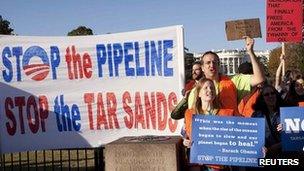Keystone XL: Canada-US pipeline route decision delayed
- Published

Protesters circled the White House on Sunday, demanding Keystone XL be scrapped
The Obama administration is to reassess the route of a controversial Canada-US oil pipeline, delaying a decision on the project by up to 18 months.
Studying a new route for Keystone XL is now expected to push the final decision past the 2012 presidential election.
The state department's handling of the $7bn (£4.4bn) project is already under review for alleged wrongdoing.
The 1,600-mile (2,700km) pipeline would run from Canada to the Texas coast.
The state department is handling public consultations on the project as the pipeline would cross the US border with Canada. In a statement Thursday, the department said it would take an "in-depth assessment of potential alternative routes in Nebraska".
Stiff opposition has come from Nebraska and environmental groups as the pipeline's route was originally planned through the state's Sand Hills regions - which contains a major aquifer.
A new route review "could be completed as early as the first quarter of 2013", the department said in a statement.
Correspondents say the delay will spare US President Barack Obama the need to make a politically sensitive decision - that will be closely watched by environmental groups and the oil industry - during a presidential election year.
Trumping oil?
In a statement, Mr Obama said he supported seeking "additional information" about the Keystone XL Pipeline proposal.
"We should take the time to ensure that all questions are properly addressed and all the potential impacts are properly understood."
The decision comes after Nebraska's legislature passed a measure on Wednesday that would require state approval of any route before TransCanada, the developer, could begin construction.
Environmental groups have used the Keystone XL review process to pressure Mr Obama on what they say is his lack of action on climate change issues and criticised the route of the project.
Republicans and oil industry groups have already said that delaying or cancelling the project would both cost new jobs and harm prospects for US energy independence.
Environmental groups hailed Thursday's decision. "The president's decision also means that our property, water and agricultural lands cannot be stripped from us without a fight," said Frances Beinecke, president of the Natural Resources Defense Council.
Meanwhile, Canadian Natural Resources Minister Joe Oliver said a US decision to delay or cancel the pipeline would not stop oil sands development in the province of Alberta.

- Published8 November 2011
- Published7 November 2011
- Published24 July 2010